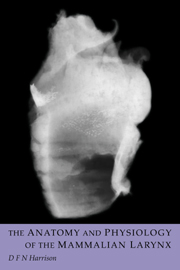2 - Collection of specimens and data
Published online by Cambridge University Press: 05 October 2010
Summary
In order to confirm the cause of death and absence of infectious disease the majority of animals dying in zoological collections undergo detailed pathological examination. This provides a rich source of material for comparative studies and the majority of the 1410 mammalian larynges studied by the author over the past 18 years have come from the Pathology Department of the Zoological Society of London. Specimens have also been donated by many other zoos, university departments of anatomy and zoology as well as interested individuals from around the world. Some of the more unusual specimens were obtained ‘fresh’ within the game parks of Kenya and South Africa; only goodwill between many colleagues made this unique collection possible.
Where technically feasible the trachea was removed with the larynx and tongue base, allowing concurrent studies of tracheal morphology and the related recurrent laryngeal nerves. Together with the 1410 non-human larynges, a further 140 laryngectomy specimens were removed from patients with malignant disease (Harrison, 1983) and another 104 larynges removed from infants registered as having died from sudden infant death syndrome (SIDS) plus a control set of larynges from a similarly aged group of 20 infants dying from congenital heart disease (provided by five Paediatric Pathologists within the United Kingdom).
An essential feature has been the need for accurate identification of individual species, together with recording of sex, age and dead weight of each animal, all requiring a high degree of interpersonal expertise.
- Type
- Chapter
- Information
- The Anatomy and Physiology of the Mammalian Larynx , pp. 19 - 29Publisher: Cambridge University PressPrint publication year: 1995
- 1
- Cited by



